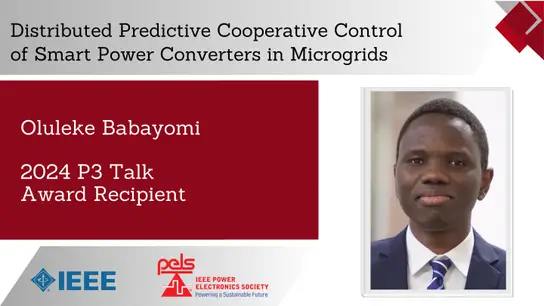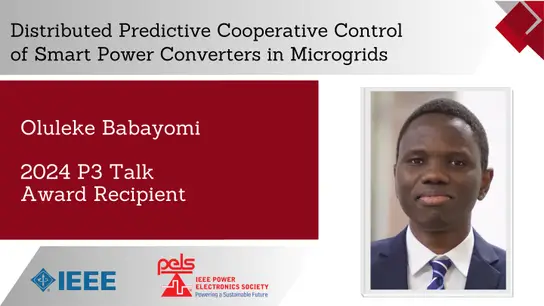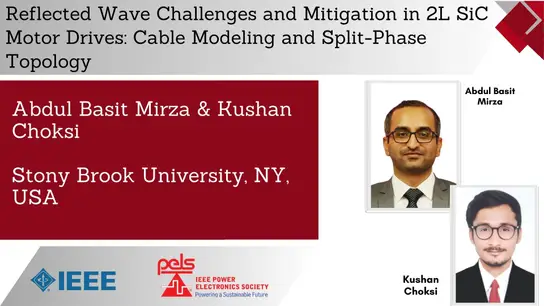Wireless Charging for Autonomous Electrified Micro-mobility Devices-A Real-world Solution for Smart Cities to be Pandemic Ready-video
Sheldon Williamson
-
Members: FreePELS
IEEE Members: $11.00
Non-members: $15.00Length: 1:15:36
01 Jul 2020
Abstract: Driverless, autonomous electrified means of micro-mobility were already touted to bring progressive lifestyle changes in numerous aspects of civilization. Examples of highly touted solutions pre-COVID included: E-bikes, drones, large/medium-sized unmanned aerial vehicles, electric scooters, and electric skateboards, just to name a few. With the outbreak of the Novel Coronavirus pandemic, humankind around the world are desperately seeking rapid commercialization of smart autonomous micro-mobility solutions, especially to avoid human interface during the COVID-19 pandemic. It is clear that electrified autonomous means of micro-mobility will become an essential support for humans in fighting COVID-19, by satisfying essential services and needs, without the necessity for human contact or engagement, thus respecting social distancing guidelines.
One of the key issues, however, with micro-mobility devices, is that their batteries do not last too long (in terms of distance on a single charge). Therefore, they have to be recharged ever so often, and this may take anywhere between 45-60 minutes (using fast charging rates). In addition, more often than not, micro-mobility based transportation have major cargo restrictions, whereby they just cannot afford to carry bulky battery packs. In general, e-micro-mobility uses electric motors that maintain speeds below 31 mph (50 km/h).
This seminar will present innovative solutions to these issues in the form of completely autonomous, weatherproof, wireless rapid recharging infrastructures. Wireless charging systems are capable of providing rapid recharge within ~2-3 minutes, making e-micro-mobility almost entirely autonomous and quite literally, allowing their on-board batteries to juice-up “on-the-move.” This presentation will cover the design, testing, and implementation of practically developed inductive power transfer (IPT), capacitive power transfer (CPT), and hybrid IPT/CPT charging solutions for future autonomous e-micro-mobility devices. Designs of IPT, CPT, and hybrid IPT-SPT couplers with power ranging between 500 Watts to 7.7 kW will be presented. The results derived from these designs will contribute specifically to the process of enhancement of wireless charging research for future emicro-mobility, as well as for e-transportation, in general. Alternatively, the lessons learned will, at the very least, facilitate the generation of new ideas.
One of the key issues, however, with micro-mobility devices, is that their batteries do not last too long (in terms of distance on a single charge). Therefore, they have to be recharged ever so often, and this may take anywhere between 45-60 minutes (using fast charging rates). In addition, more often than not, micro-mobility based transportation have major cargo restrictions, whereby they just cannot afford to carry bulky battery packs. In general, e-micro-mobility uses electric motors that maintain speeds below 31 mph (50 km/h).
This seminar will present innovative solutions to these issues in the form of completely autonomous, weatherproof, wireless rapid recharging infrastructures. Wireless charging systems are capable of providing rapid recharge within ~2-3 minutes, making e-micro-mobility almost entirely autonomous and quite literally, allowing their on-board batteries to juice-up “on-the-move.” This presentation will cover the design, testing, and implementation of practically developed inductive power transfer (IPT), capacitive power transfer (CPT), and hybrid IPT/CPT charging solutions for future autonomous e-micro-mobility devices. Designs of IPT, CPT, and hybrid IPT-SPT couplers with power ranging between 500 Watts to 7.7 kW will be presented. The results derived from these designs will contribute specifically to the process of enhancement of wireless charging research for future emicro-mobility, as well as for e-transportation, in general. Alternatively, the lessons learned will, at the very least, facilitate the generation of new ideas.
Primary Committee:
PELS


